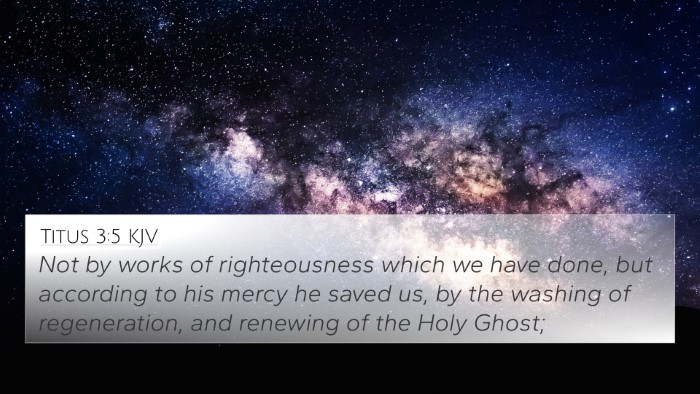Understanding Romans 11:6
Romans 11:6 states, "And if by grace, then it is no longer by works; if it were, grace would no longer be grace." This verse is a pivotal part of Paul's discussion on salvation, grace, and the role of works in the life of a believer. The essence of this verse lies in the contrast it draws between grace and works, emphasizing that grace is a gift of God that cannot be earned by human effort.
Summary of Insights from Commentaries
-
Matthew Henry's Commentary:
Henry highlights that grace is the means of salvation, and it is entirely unattainable through human endeavors. He explains that if salvation were based on works, it would nullify the very nature of grace, which is unmerited favor from God.
-
Albert Barnes' Notes:
Barnes reflects on the distinction between grace and works, noting that grace signifies a divine influence that transforms the heart, while works refer to human actions that cannot contribute to salvation. He stresses that God’s grace is fundamentally a gift that should inspire humility and gratitude.
-
Adam Clarke's Commentary:
Clarke emphasizes that true grace cannot coexist with the notion of works earning merit. He warns against any belief system that attempts to balance faith with works for salvation, asserting that grace must remain pure to be effectively transformative.
Theological Implications
The implications of Romans 11:6 are significant for Christian theology. It reinforces the doctrine of grace alone (Sola Gratia), a bedrock principle particularly emphasized during the Reformation. Understanding this principle helps believers appreciate their dependency on God's mercy rather than their own efforts.
Cross-References to Romans 11:6
- Ephesians 2:8-9: "For by grace you have been saved through faith, and that not of yourselves; it is the gift of God, not of works, lest anyone should boast."
- Titus 3:5: "Not by works of righteousness which we have done, but according to His mercy He saved us, through the washing of regeneration and renewing of the Holy Spirit."
- Galatians 2:16: "Knowing that a man is not justified by the works of the law but by faith in Jesus Christ, even we have believed in Christ Jesus, that we might be justified by faith in Christ and not by the works of the law; for by the works of the law no flesh shall be justified."
- Romans 4:4-5: "Now to him who works, the wages are not counted as grace but as debt. But to him who does not work but believes on Him who justifies the ungodly, his faith is accounted for righteousness."
- 2 Timothy 1:9: "Who has saved us and called us with a holy calling, not according to our works, but according to His own purpose and grace which was given to us in Christ Jesus before time began."
- Philippians 3:9: "And be found in Him, not having my own righteousness, which is from the law, but that which is through faith in Christ, the righteousness which is from God by faith."
- Hebrews 11:6: "But without faith it is impossible to please Him, for he who comes to God must believe that He is, and that He is a rewarder of those who diligently seek Him."
Importance of Cross-Referencing Bible Verses
Cross-referencing Biblical texts can enrich our understanding of individual verses and their meanings. By exploring connections between Bible verses, such as the ones mentioned above, believers can develop a broader, more cohesive understanding of biblical doctrines.
Tools for Cross-Referencing: Several tools can aid in cross-referencing Bible verses, including Bible concordances and cross-reference guides. Utilizing these resources can assist in identifying links between concepts throughout the scriptures.
Methods for Effective Bible Study
To enhance your Bible study experience, consider employing the following methods:
- Comparative Bible Verse Analysis: Study similar themes across different books.
- Thematic Connections: Identify overarching themes that connect both the Old and New Testaments.
- Group Study: Engage in group Bible studies to explore inter-Biblical dialogue.
Conclusion
Romans 11:6 serves as a crucial reminder of the transformative nature of God's grace in the lives of believers. By understanding this verse in its context and through cross-referencing it with other scriptures, Christians can deepen their faith and grasp a fuller theology surrounding grace and works. Embracing a grace-centered faith is essential for spiritual growth and genuine relationship with God.












